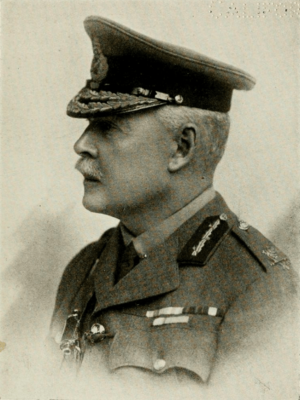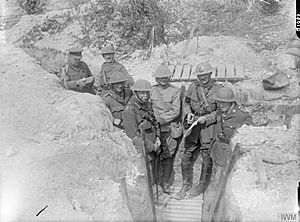Gerald Cuthbert facts for kids
Quick facts for kids
Gerald James Cuthbert
|
|
|---|---|

Major-General Cuthbert, c. 1917
|
|
| Nickname(s) | "Bluebell" "Spit and Polish" |
| Born | 12 September 1861 |
| Died | 1 February 1931 (aged 69) |
| Allegiance | |
| Service/ |
|
| Rank | Major-General |
| Unit | Scots Guards |
| Commands held | 1st Scots Guards 4th London Brigade 13th Brigade 39th Division 72nd Division |
| Battles/wars | Mahdist War Second Boer War First World War |
| Awards | Companion of the Order of the Bath Companion of the Order of St Michael and St George Mentioned in Despatches |
Major-General Gerald James Cuthbert was a British Army officer. He was born on September 12, 1861, and passed away on February 1, 1931. Cuthbert led soldiers in important conflicts. These included the Second Boer War and the First World War.
He joined the Scots Guards in 1882. He served in places like Egypt and Sudan. After the Boer War, he commanded a group of soldiers called a brigade. Later, he led a division during World War I. He fought on the Western Front from 1914 to 1917. He retired from the army in 1919.
Contents
Early Military Life
Gerald Cuthbert was born in Northumberland. He went to a special military school called the Royal Military College, Sandhurst. In May 1882, he joined the army. He first served with the Oxfordshire Light Infantry. Just two months later, he moved to the Scots Guards.
He fought in the Sudan Expedition in 1885. There, he took part in the Battle of Suakin. He was also an assistant to a high-ranking general for a time. In 1893, he became a Captain. He was promoted to Major in 1899.
Fighting in the Boer War
Cuthbert served a lot during the Second Boer War in South Africa. He was involved in many battles. Some of these were Belmont, Modder River, and Magersfontein. He also fought at Johannesburg and Pretoria.
From January to July 1901, he led the 1st Battalion Scots Guards. He was recognized for his bravery during the war. He was promoted to lieutenant-colonel. After the war ended in 1902, he returned to England.
Between the Wars
After the Boer War, Cuthbert again commanded the 1st Battalion Scots Guards. This was from 1904 to 1906. Later, he worked as an assistant adjutant-general in Egypt. He stayed there until 1909.
He then returned home to command a group of soldiers called the 4th London Brigade. This was a unit of the Territorial Force. In February 1914, he was given command of the 13th Infantry Brigade. This was a regular army brigade stationed in Ireland.
World War I Service
When the First World War began in August 1914, Cuthbert was still leading the 13th Brigade. He took his soldiers to France. He led them through important early battles. These included the Retreat from Mons and the First Battle of the Marne. He also fought in the First Battle of the Aisne.
He was sent back to England in September 1914. In November, he was given command of the 140th Infantry Brigade. He had commanded this group before the war. He stayed with them through 1915 and 1916. He led the division during a German attack on Vimy Ridge in May 1916.
Cuthbert was known for being very strict about cleanliness. Soldiers even nicknamed him "Spit and Polish." He also had an earlier nickname, "Bluebell."
Leading a Division
In July 1916, Cuthbert was promoted. He became the commander of the 39th Division. He led this division during the later parts of the Battle of the Somme. He also commanded them during the Battle of Pilckem.
Some of his superiors thought he was stubborn. They also felt he didn't have many new ideas for training or tactics. However, they did note his strong focus on discipline. In August 1917, he was moved from this command. He then led the 72nd Division in England. Later, he commanded Shorncliffe Army Camp. He retired from the army in 1919.
Later Life
Gerald Cuthbert never married. After he retired from the army, he lived in a cottage on his family's estate. This was near Beaufront Castle. He passed away in February 1931, at 69 years old.
 | Chris Smalls |
 | Fred Hampton |
 | Ralph Abernathy |


